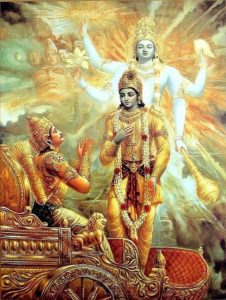Fast Forward To Our Ancient Vedic Past:‘Developing Environmental Conscience’
– Past, Present and Future
Anyone who has been on this planet even for a few decades has seen devastating natural disasters; eruptions of volcanoes, tsunamis, hurricanes, earthquakes, glacier avalanches, flash floods and forest fires. Every time any of these happens, we watch helplessly as living creatures and man made structures are swept away and destroyed like a pack of cards. The horror lasts for sometime, the conscience of mankind is rattled and then complacency sets in again. We go back to our ruthless exploitation of nature as if nothing had happened.
In October – November 2019, something terrible started, reportedly from Wuhan in China, which was undoubtedly nature’s response to man’s greed and irresponsible behavior. About three million people are already dead and most nations are in the grip of 2nd and 3rd waves of the COVID 19. The numbers of the afflicted and dead are constantly rising. The virus has mutated into deadlier ones. If mankind does not heed now, there may not be another opportunity at all.

It is generally assumed, rather naively and also somewhat erroneously, that environmental pollution and the consequent environmental conscience are phenomena of the twentieth century, made critically acute in the twenty-first century and more recently from the year 2020 in view of this raging COVID 19 pandemic. Not quite so.
The western school of thought considers Earth, a beautifully luminous blue planet and of about 4-5 billion years of age, to have become habitable with life forms only 100-200 million years ago. While our ancestors (‘Rishis’ in ‘Vedas’) maintained that human civilization has existed for millions of years. It is periodically wiped out and is regenerated over and over again. This cycle has been going on for millions of years.

According to the Western scientific theories, the great apes appeared 14 million years ago and our species of the Homo sapiens evolved only about 200 thousand years ago. The ancient civilizations like the Indus Valley, Egyptians, Mesopotamians, Mayans etc are estimated to be just about 10,000 to 6,000 years old. During all this time the Earth was not damaged.
The real blow was the industrial revolution, which occurred just about 200 years ago. The pace of the environmental degradation assumed alarming proportions from the middle of the last century and by now the entire planet is irreparably damaged; its eco systems wounded and many of its species either extinct or on the brink of extinction. Considered in this context, the alarming environmental degradation and consequent evolution of environmental conscience can be considered a ‘recent’ phenomenon.

Starting from the invention of the wheel, each technological invention, though made life easier than before, lured humans away from nature and into the folds of ever expanding urban conglomerations. Moreover, the psychological evolution of mankind did not keep pace with technological and scientific developments. The insecurities of the caveman persisted. Greedy humans have been exploiting nature as if there is no tomorrow and without sparing a thought either to the future of the planet – the only home we have in this entire universe – or even to their own future generations.
It was not always like this or in every part of the world. All ancient civilizations have believed in harmony between nature and human beings. In our ancient ‘Vedic culture’ this had been taken to an altogether different level.
The ‘Sanatan Dharma’ – loosely called Hinduism – is based on the principles propagated in the four Vedas. These Vedas are believed to be eternal. They were present at the time of the Creation itself. When the Supreme Energy (‘nirgun, nirakar Brhm’) manifested itself in the form of ‘Brahma’ -the Creator, he was holding the four Vedas in his four hands.
The Vedas, particularly the Yajurveda contains ritualistic hymns to propitiate the natural forces like earth, water, wind, fire, sky (space) – also called the five basic elements (‘panch bhoot or tatv’). This was both at the gross physical level and metaphorically at the subtle spiritual levels focusing on the need to give back to the environment what the humans were taking from it.
The recognition of criticality of ecological balance to the sheer survival of the human race and that of the planet earth is as old as the creation itself in the Vedic school of thought.

Much later, in the ‘Dwapar yug’ the great battle between the forces of evil and good to uphold justice and ‘dharma’ called ‘Mahabharat’ is believed to have taken place. This is estimated to be around 5 thousand years ago. In the middle of the battlefield, just before the onset of the combat, Sri Krishna – the God incarnate (‘sagun, saakar form of nirgun, nirakar Brham’)- explains to a bewildered and despondent Arjuna the importance of giving back to the nature and society both physically and metaphorically {shlokas 12,13,14 and 15 of the 3rd Chapter- Karm Yog- given below}.
इष्टान्भोगान्हि वो देवा दास्यन्ते यज्ञभाविताः।
तैर्दत्तान प्रदायैभ्यो यो भुङ्क्ते स्तेन एव सः।
( Shlok 12 ch. 3 Gita )
“The celestial gods, being satisfied by the performance of sacrifice, will grant you all the desired necessities of life. But those who enjoy what is given to them, without making offerings in return, are verily thieves.”
The Lord decrees that the only way to consume is to first make an offering to the natural forces. When you protect and strengthen nature, she in turn nourishes you. But, if you just grab from nature without protecting it, then you are stealing from it and will have to face the consequences.
यज्ञशिष्टाशिनः सन्तो मुच्यन्ते सर्वकिल्बिषैः ।
भुञ्जते ते त्वघ्म पापा ये पचन्त्यात्मकर्णात।I
(Shlok 13 ch. 3 Gita )
“The spiritually evolved, who eat food that is first offered in sacrifice, are released from all kinds of sin. Others, who cook food for their own enjoyment, verily eat only sin.”
The basic teaching of Gita is ‘Ishwar arpana’ – all my actions / efforts are dedicated to the Supreme Lord without any attachment or desire to the result – and ‘Ishwar prasad buddhi’ – whatever is the result of my action, I accept it humbly as the Grace of the Supreme Lord. This is also known as ‘nishkam karm’ (action without attachment to the result).
Even such a basic action as cooking and partaking of a meal is elevated to the status of a ‘yagnya’ (sacrifice). It is first offered to God and then consumed as ‘prasad’. We may all remember our parents and grandparents removing small morsels of food and keeping them aside as offerings before starting their meals. Food is only a metaphor here. The intention behind the act is even more important than the act and the logic extends to just not cooking and eating but to all our actions and interactions with nature and fellow creatures around us.
अन्नाद्भवन्ति भूतानि पर्जन्यादन्नसम्भवः।
यज्ञाद्भवति पर्जन्यो यज्ञ कर्मसमुद्भवः।I
(Shlokas 14 ch. 3 Gita )
“All living beings subsist on food, and food is produced by rains. Rains come from the performance of sacrifice, and sacrifice is produced by the performance prescribed duties in selfless and detached manner.”
कर्म ब्रह्मोद्भवं विद्धि ब्रह्माक्षरसमुद्भवं।
तस्मात्सर्वगतं ब्रह्म नित्यं यज्ञे प्रतिष्ठितं।
(Shlokas 15 ch. 3 Gita )

Which duties?
“The duties for human beings are described in the Vedas, and the Vedas are manifested by God Himself. Therefore, the all pervading Lord is eternally present in acts of sacrifice.”
Elaborating on the ‘life cycle’, the Lord says all the living creatures are dependent on nourishment, which comes from the crops nurtured by rain. The rain comes from ‘yagnya’ and ‘yagnya’ depends on your ‘karm’ (action). Here, the word ‘yajnya’ does not mean only the physical act of lighting a fire and making offerings but, more importantly, metaphorically which implies looking after nature and ecology. This is the ‘sustainable development’ model given to us many thousand years ago.
This concept becomes further clearer when describing the five necessary ‘yajnas’. The Gita mentions the ‘Dev Yajna’ and the ‘Bhoot Yajna’ along with other three ‘yajnas’. The former is protection and preservation of inanimate natural forces mentioned earlier and the latter is nurturing all living creatures – the animate world around us. The ‘Vedas’ impart the same soul to all living creatures. So, the question of exploitation should not arise at all.
Point being that the environmental concerns and the environmental conscience were very much part of our ethos in our ancient past even when these were not probably as critical as these are today. We forgot our goals somewhere in between and lost our path.

Now the situation is so dangerous that the glaciers are falling into the oceans and consequently vast areas of mangroves are getting submerged, many rare species are disappearing on almost a daily basis, cities are enveloped in a thick haze of pollutants. Closer home, the usual delightfully sunny winter mornings are lost to dark smog shrouded depressing ones. With a raging pandemic, everyone is forced to stay at home, the schools, offices, malls and recreation centers are closed. People are walking around with masks. Tourism and normal life has come to a stand still. Economies are hit hard and poverty is rising all over the world.
The vaccines have brought a feeble ray of hope but these too will not be fully effective or for long unless mankind changes its attitude and goes back to the ‘Vedic’ school of thought about the environmental conscience.
Initially the developing economies were reluctant, perhaps justifiably so, to share the burden of the ‘mistakes and irresponsible behavior’ of the developed countries. The rich and powerful have always cornered the resources of the world and the poor have suffered. But, now the situation is so alarming that all the stakeholders – the governments, the religious institutions, the civil societies and the citizens of the entire world- have to pitch in and do their best to combat the looming destruction. But, one has to admit that the world would not have sunk into such depths of despair if it had followed the ‘Vedic wisdom’.
Neerja Rajkumar
IAS (Retd)
Gurgaon, Haryana

I was born in Rampur (UP), brought up and educated in Lucknow. Did my MA in Psychology from Lucknow University and M. Phil. from the IIPA, Delhi. I joined the Indian Administrative Service in 1972 and worked as a Management Trainee with the DCM group of industries for a year before that. Held important assignments both in Karnataka at the state level and Government of India at the central level. Deeply interested in reading, writing, Hindustani vocal music and travelling. Retired as Chief Secretary to the Government of Karnataka and have now settled down with my husband and batchmate Mr. Falguni Rajkumar in Gurgaon.





